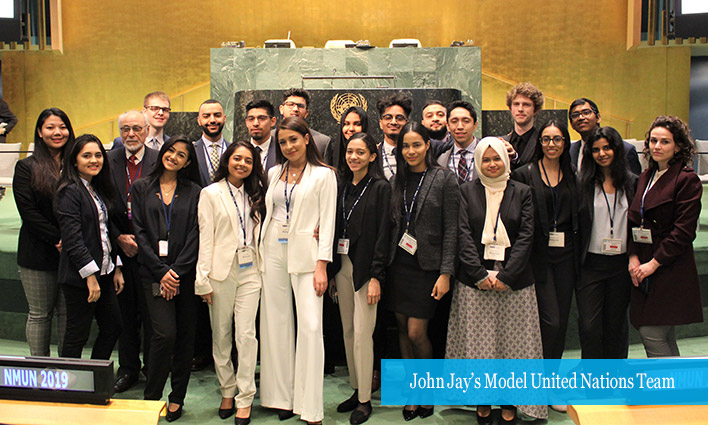
After a week of competition, John Jay’s Model United Nations (U.N.) Team won The Distinguished Delegation Award at the 2019 National Model U.N. Conference where they participated from April 14 – 18. Recognized for the quality of their preparation and contribution in all committees, this was the 15th consecutive year that John Jay ranked among the top 10 percent of colleges and universities from over 30 countries who competed at the conference. “The goal of this conference is to work in a close-knit team, striving for a common goal, while developing skills such as public speaking, dispute resolution, and how to conduct in-depth research,” said Sean Skeeters ’19, President of John Jay’s United Nations Student Association (UNSA). “This is why our delegates keep coming back year after year.”
Mentored by Jacques Fomerand, Professor in the Department of Political Science, and led by Skeeters, John Jay’s UNSA represented the Federation of Malaysia. The team served as delegates on various Model U.N. committees tasked to deliberate, negotiate, draft, and adopt resolutions on various issues. Some of the issues included: climate change, peaceful use of outer space, combatting human trafficking, disaster relief assistance, and transitioning to sustainable energy. Recognized for their hard work and dedication, we spoke with UNSA President Skeeters, to learn more about the conference and his experience in Model U.N.
What was it like participating at this year’s National Model U.N. Conference?
This year’s conference was an amazing experience because of the wide array of topics presented to our delegates. These topics ranged from External Debt and Sustainable Development to Mainstreaming Gender in Peacekeeping Operations. National Model United Nations (NMUN) decides the committees that will be represented at the conference and the committee’s topics. In the session, the primary focus for us was to get our delegation on as many resolutions as possible, providing realistic and attainable recommendations to the committees. The conference itself is a very intense environment because of the sheer number of delegates, most of whom are equally as prepared as we are, and take their country assignment just as seriously. In-depth discussions on key topics included nuclear disarmament and education as a tool to combat extremism.
“John Jay has been in the top 10 percent of participating delegations for the last fifteen years, so receiving this award was gratifying.”—Sean Skeeters
The team has been preparing for this conference for two semesters, what was that process like?
It was a relatively intense preparation program. We make sure to focus on substantive research on topics presented before individual committees, as well as having an equally strong emphasis on the procedural aspect of our preparations for each conference. The committees we represent and the topics we discuss change every year depending on the directors of the committees as well as the country or delegation John Jay is selected to represent for that conference. This year we represented Malaysia, and we had a total of nine committees.
What made you want to join the Model U.N.? What have you learned about yourself?
When I first started with the Model U.N. team three years ago, I was looking for a club that discussed international affairs. My major here at John Jay is Political Science, and I wanted to be part of a club that had incorporated elements of a debate team. Through the Model U.N., I have become more confident than I was prior to my first conference. When I first joined the team, I learned that I had a limited idea of international cooperation. Working with delegates from across the globe on these wide-ranging topics, and the resolutions we create in these conferences, are just a small part of a much larger, broader agenda for sustainable living as a whole, centered around an organization such as the United Nations, with all of its subsidiary bodies and specialized agencies that fall under their purview.
John Jay’s Model U.N. team received The Distinguished Delegation Award. What does this award mean to you?
It is the second highest honor for a delegation at the NMUN. John Jay has been in the top 10 percent of participating delegations for the last fifteen years, so receiving this award was gratifying. It was even more special because we worked with a terrific group of new delegates that joined our team this year, and despite our youth, we were able to earn this achievement.
Why is it important for students to take part in conferences like this one?
These conferences are not only great opportunities to network with like-minded individuals, but they also put our delegates in situations that push them to improve their skills. Success at these conferences is very heavily predicated on how you can interact with fellow delegates, and how you persuasively convey the ideas of your assigned nation. I can say from experience, that these conferences give our delegates the best opportunity for realistic, hands-on experience in diplomacy, dispute resolution, and provides a much deeper understanding of how the United Nations works.



